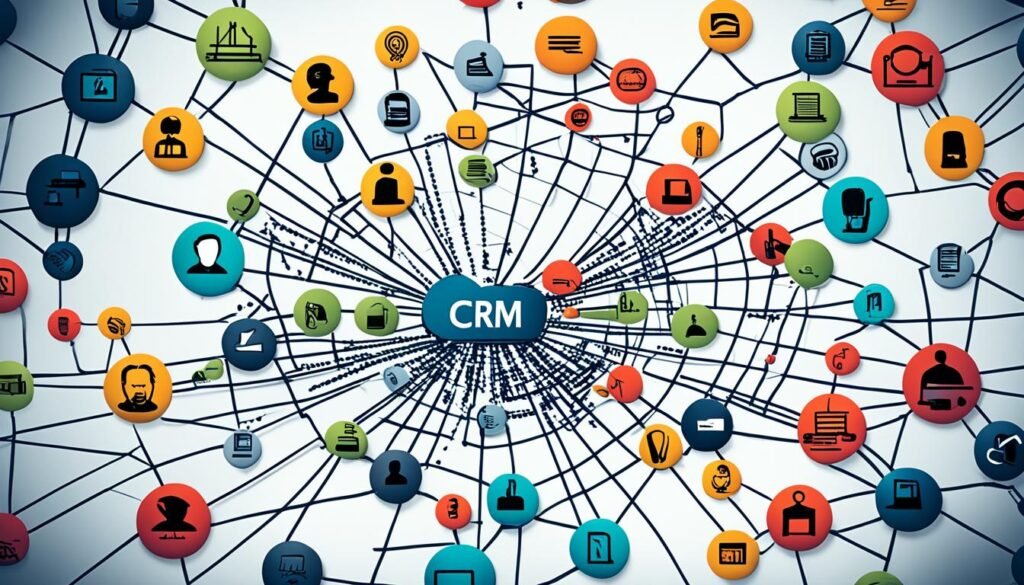CRM software is key for businesses wanting to make their marketing, sales, and customer service better. It’s powerful when it works with other business tools. This makes a smooth, efficient system that helps improve customer experiences and business outcomes.
Finding the right way to connect your CRM with other tools is crucial. You can use custom code or native integrations. This way, you get benefits like smoother processes, better customer experiences, and more efficiency in your company.
We’ll explore strategies, tips, and best practices for linking your CRM with other business tools. If you want to boost your marketing, improve customer service, or understand your customers better, the right CRM integration is key.
Table of Contents
Strategies for Integrating CRMs with Other Tools
It’s key to link your CRM with other business tools to boost customer experience and streamline processes. This integration saves time by avoiding the need to switch apps. It also gives a full view of customers and leads.
Here are some top ways to connect a CRM with other tools and software:
Writing Custom Code
Writing custom code lets you connect your CRM to certain systems in a flexible way. But, it takes a lot of development work and needs ongoing upkeep.
Investing in a Single Provider
Choosing a CRM and tools from the same provider makes integration smooth. But, it might limit the tools you can use.
Leveraging an API
An API lets you integrate your CRM with other apps in a more tailored way. This method gives you control over how data moves between systems.
Leveraging Native Integrations
Many CRMs come with built-in connections to other tools. This makes linking your CRM easy without needing to code.
Using Connector Software
Tools like Zapier help businesses link their CRM with over 5,000 apps. This lets you sync data across different platforms without needing custom code.
Using a smart approach to CRM integration can save time and boost productivity. It also helps you understand your customers and leads better.

“Integrating your CRM with other tools is essential for delivering exceptional customer experiences and driving business growth.”
Optimization Techniques for CRM Integrations
To get the best from your CRM integrations, follow these tips. Work closely with your CRM provider to use all its features. Pick the best integration methods, like native, third-party connectors, or custom development, for your needs. Set clear goals for your integration from the start.
Work with users from different teams to know what they need and what hurts them. Make sure data is safe with encryption, secure APIs, and user checks. Make sure data fields match up between your CRM and other systems to keep things consistent.
- Give good training and support to help users adopt and use the integration well.
- Keep testing and watching the integrations, looking at how they perform and what users say, to make changes as needed.
Optimizing your CRM integrations can unlock your tech stack’s full power. It can make things more efficient and lead to better business results.
“Nutshell offers a variety of integrations, both native and middleware, and the ability to connect more tools through AppConnect, aiming to help businesses increase efficiency, maximize tool utility, and promote business growth.”
Linking your CRM with other business tools can change the game. But, it’s key to do it smartly. By focusing on optimization, you can make sure your CRM integrations work well and help your business goals.
CRM Integration
Integrating your CRM software with other business tools is key for better data management and efficiency. But, it can face challenges like data silos, wrong integrations, too much data, and high costs. With smart strategies, businesses can beat these issues and use CRM integration to their advantage.
Choosing a CRM system with email marketing and other communication tools is a good start. It helps streamline marketing and gives a clear view of customer interactions. Also, picking the right integration methods, like APIs or pre-built connectors, makes the process easier and faster.
Good data management practices, like regular data cleaning and standardizing, help with data overload and silos. By looking at the costs and benefits of different CRM integrations, businesses can make smart choices that fit their budget and goals.

Successful CRM integration brings many benefits, like smooth marketing strategies, better customer experiences, a deeper understanding of customers, and automation that saves time. By tackling challenges and using the right strategies, businesses can fully benefit from their CRM software. This leads to more efficiency and happier customers.
Benefits of Integrating a CRM with Other Tools
Linking your customer relationship management (CRM) software with other business tools brings big benefits. It makes workflows smoother, helps understand customers better, and boosts business growth.
Seamless Marketing Strategies
When your CRM works with marketing tools, you can make customer journeys smooth and personal. This means you can send targeted campaigns, track how customers interact, and make your marketing better.
Smooth Customer Journeys
By linking your CRM with other apps, you ensure a smooth customer experience everywhere. This builds stronger customer bonds, leading to more repeat business and word-of-mouth.
A Better Understanding of Your Customers
Putting customer data from different sources into your CRM gives a deeper look at your audience. This helps you craft better marketing, tailor your offers, and guess what customers need.
Time-Saving Automation
CRM integration automates tasks like email campaigns, customer service, and data checks. This saves time, letting your team focus on big-picture tasks. It boosts productivity and efficiency.

“Integrating your CRM with other business tools can unlock a wealth of benefits, from seamless marketing strategies to time-saving automation.”
Using CRM integration helps streamline your work, improve customer experiences, and make smarter choices. This pushes your business ahead.
Ensuring Secure CRM Integrations
As companies link their CRM software with other tools, keeping data safe is key. Risks include unauthorized access, data breaches, and not meeting rules. To stay safe, following best practices for CRM integrations is vital.
Potential Security Risks
Unauthorized access is a big threat in CRM integrations. With many ways to get in and data moving around, the chance of data breaches goes up. Also, following rules like GDPR and CCPA is crucial when handling customer data in CRM integrations.
Best Practices for Secure Integrations
- Check third-party providers well and see if they meet security standards like SOC 2 and ISO 27001.
- Use secure ways to check who can get into CRM data and APIs, like tokens.
- Set up access controls in the CRM so users only see what they need to see.
- Encrypt data to keep it safe from prying eyes during storage and when it’s moving.
- Keep CRM and integrations updated with the latest security fixes.
- Do regular security checks and risk assessments, either with tools or experts.
- Use API limits to stop too much traffic and denial of service attacks.
- Train employees on security to make CRM integrations stronger.
By using these CRM integration security tips, companies can lower risks when linking CRM with other tools. This keeps data security strong. It’s key to follow integration best practices to keep systems safe and data private.

“Securing CRM integrations is not just a technical challenge, but a strategic imperative for businesses to protect their customer data and maintain compliance.”
Integrating a CRM with Email Marketing Platforms
Linking your CRM with email marketing tools makes your campaigns more efficient. It automates emails, tracks how well they do, and lets you send targeted messages. This saves time, makes messages more personal, and boosts your email marketing results.
Automate Email Campaigns
When your CRM and email marketing are connected, you can set up automated emails. These emails can go out based on what customers do or when you plan them. This helps you look after leads, say thanks for buys, and wake up inactive subscribers without doing it all by hand.
Track Campaign Performance
Linking your CRM with email marketing tools lets you see how well your emails are doing. You can check open rates, click-through rates, and conversion rates right from your customer data. This info helps you make your emails better and understand what your audience likes.
Email List Segmentation
Using CRM data, you can sort your email lists by things like age, what they’ve bought, or how active they are. This way, you can send emails that really speak to each person. This means more people will open your emails, click on links, and maybe even buy something.
“Integrating a CRM with email marketing platforms can transform your email marketing efforts, enabling you to save time, personalize communications, and maximize the impact of your campaigns.”
Conclusion
Integrating your CRM with other business tools opens up many benefits for your company. It makes workflows smoother, improves data accuracy, and boosts customer experiences and sales. You can choose from native integrations, single-provider solutions, or custom code and connectors.
This right strategy can change the game for your business. When starting your CRM integration, remember to focus on security and optimizing your tools. Connect your CRM with email marketing, social media, HR tools, and more for a full view of your business and customers.
This approach helps you make smart decisions and serve your customers better. CRM integration is key for businesses aiming to succeed in today’s market. It helps streamline operations, improve customer relationships, and drive success over time.



